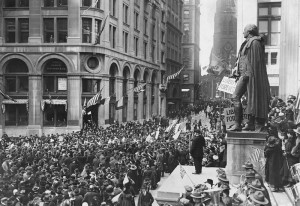
On November 11, 1918, at 11 am, the largest war that the world had witnessed up to that time, was over. World War I had begun ages ago, it seemed like. It left Western Europe in ruins, Eastern Europe in fragments, and the Middle East in a state of tumult. On this day, ninety-five year ago, an armistice was signed between the Allies and the Germans in Compiegne, France. The German Kaiser, Wilhelm, had abdicated and fled to Holland just days before and all hopes seemed lost for the Germans. Their allies had all fallen away. Bulgaria was the first to cave in. After that, the Ottomans broke down and finally, the German’s dear and loyal brethren, the Austro-Hungarians, had ended their war with Italy. Germany was the last man standing.
Much of Germany was in turmoil during the last few weeks of October and November. German sailors revolted in Wilhelmshaven on October 29. This mutiny spread across the rest of Germany and turned into a full revolution. Friedrich Ebert, a Social Democrat, declared a new government, the Weimar Republic and hastily began the negotiation process with the Allies. In fact, Ebert and others in the German parliament had been pushing for a negotiated end to the war for a while.
On November 11, the two parties met in a railroad car in the forest of Compiegne, in France. Those representing the Allies included Ferdinand Foch, the Allied commander-in-chief, and Rosslyn Wemyss, the First Sea Lord of Great Britain and their aides. Germany was represented by Matthias Erzberger, a political figure, and Major General von Winterfeldt of the army.
Ebert and Erzberger had hoped that the Allies would accept the Fourteen Points of Woodrow Wilson, President of the United States. These Fourteen Points were Wilson’s recipe “to make the world safe for democracy”. His points were simple and rather gentle. Wilson believed that if the Allies dealt harshly with the Germans, that more war would come. However, if the Allies were able to implement the Fourteen Points, that there would be no more war. Ever. His goal was total world peace. Unfortunately for Wilson and Germany, the Allies rejected his proposal. Britain and France had fought long and hard for this victory and didn’t want to see it wasted on “Fourteen Points”. French Premier, Georges Clemenceau, was especially hostile to Wilson’s plan. When the Treaty of Versailles was signed in 1919, Wilson’s plan was cut to shreds. Wilson was in ill health at the time. Perhaps had he been stronger, he would have fought more ferociously for his proposal of peace. In the end, Germany was ruined. A young, failed painter would rise from the wreckage of the defeated Germany to rule his homeland with an iron fist. I think we all know his name.
Ninety-five years after that armistice was signed, it is still celebrated, to some degree. At first, America celebrated November 11 as “Armistice Day”. This holiday celebrated the end of the First World War and the service of the American servicemen and women who served during that conflict. After World War II, a veteran named Raymond Weeks had the idea of using November 11 to celebrate all veterans. Veteran’s Day was born in 1954.

The compelling question is, “Would have Wilson’s Fourteen Points created a long lasting peace?” An argument could be made that it would not. While the other allies may have made a mistake with reparations and the war guilt clause, the “unconditional surrender” demand in WWII proved to bring about a longer lasting peace with the three antagonists being allies today. Food for thought.
Very good question Robert. We can only be speculative at best, as to the future of a Europe under Wilson’s Fourteen Points. Arguments could be made on both sides. God is in control though. His providence is clear. As always, I appreciate you reading.